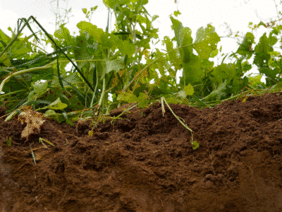(Frick, August 11, 2015) A recent study by McGee from the University of Oregon has led to discussions in international media and on the web. This study addresses an interesting question and applies advanced statistics for its analysis. However, we identify several methodological flaws that invalidate the results. Most important are 1) that the conclusions cannot be derived from the hypotheses that were tested and 2) that the data used are not adequate for the analysis that was undertaken.
This response to the article by McGee (2015) and to the related media coverage in the Guardian, Mail Online, the University of Oregon page and others complements the response by IFOAM from August 4, 2015, in which a wealth of evidence, that has not been acknowledged in McGee (2015), is provided for the GHG mitigation effects of organic agriculture. This evidence is based on scientific literature reporting measured field and farm level data. Here, we focus on further flaws in the formulation of the hypotheses, the data used for the analysis, and the conclusions drawn in McGee (2015).
The paper by McGee addresses an interesting question and applies advanced statistics for its analysis. However, we identify several methodological flaws that invalidate the results. Most important are:
- that McGee (2015) tests a hypothesis that does not correspond to his main question, and which does not allow McGee to derive the conclusions that are drawn in his paper and reported in the media coverage;
- that the data used are not adequate for the analysis because:
- the dependent variable does not reflect the climate change characteristics of organic agriculture (e.g. different emission factors),
- the explanatory variables neglect the livestock sector,
- trade aspects are missing.
In the whole comment, whose link is below, you find further details about the criticism.
Further information
FiBL contacts
- Adrian Müller
- Andreas Gattinger
- Colin Skinner
Links and Downloads
- Comment of FiBL (190.2 KB)
- The response of IFOAM (130.4 KB)
- link.springer.com: Link to Julius McGee
- around.uoregon.edu: News about the study on the Website of the University of Oregon
- theguardian.com: Article about the study
- dailymail.co.uk: Article about the study





